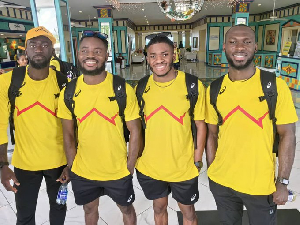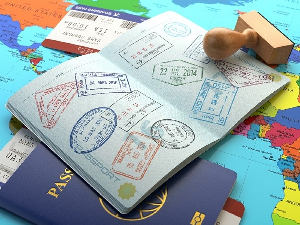- Home - News
- TWI News | TV
- Polls
- Year In Review
- News Archive
- Crime & Punishment
- Politics
- Regional
- Editorial
- Health
- Ghanaians Abroad
- Tabloid
- Africa
- Religion
- Election 2020
- Coronavirus
- News Videos | TV
- Photo Archives
- News Headlines
- Press Release
General News of Wednesday, 2 April 2003
Source: Ghanaian Chronicle
Nkrumah's Legacy in Ruins
The people who paid the high price of forfeiting their lands for the creation of the Volta Dam are today starving under the pall of poverty, disease and deprivation.
While the aged and others past working age are dying of malnutrition and curable diseases, the able-bodied ones are fleeing the resettlement towns founded for them some 37 years ago when the dam was constructed.
Aside of the premature loss of lives, the socio-economic burdens that the youth from the settlements are likely to pose in the urban areas, where they drift in their hundreds to, is expected to be considerable.
A survey conducted last week by Chronicle in all eight resettlement communities created by the Volta River Authority (VRA) in the Eastern region, painted these and other sad pictures.
The largest man-made lake, one of the many ambitious development projects initiated by President Kwame Nkrumah in the First Republic, is behind the Akosombo dam in the region. In view of the thousands of hectares of arable land that the dam was destined to swallow, hundreds of farming communities, then living along or near the Volta river were asked to evacuate and relocate on the government's 'promised' land, which became the resettlement towns.
Those that fall in the Eastern region include Nkwakubew, Apegusu, Npakadan, Adjina and New Senche in the Asuogyaman district. The rest are Somanya in the Yilo and Adukrom and Anyabone, both in the Upper Manya district.
Over the last four decades, successive governments have failed to compensate the chiefs and people whose lands were annexed for the resettlers, Chronicle learnt.
At the Nkwakubew resettlement area, otherwise known as New Dodi, it was observed that the one-unit bedroom structures built for each family are collapsing on the occupants.
Most of the structures, which are beyond repair, have actually collapsed, while others have been left in the bush and reduced to havens for reptiles and other dangerous animals.
Living in these unit structures is very difficult, the occupants say, because they are without kitchen, toilet and bathroom facilities; a situation that leaves occupants with no choice than to do every house chore in the open.
In the whole of the Nkwakubew community, the only public place of convenience was closed down after it became a death trap several years ago. Good drinking water is also hard to come by.
Currently, the residents are drinking unclean water they collect from streams several miles away, since the taps ceased flowing two years ago.
What will surprise readers most is that these people who sacrificed their lives and property for the generation of electricity for the whole country were not enjoying electricity all these years until last November 11 when power was extended to the resettlement after they threatened to go on a demonstration.
The late Dr. Kwame Nkrumah, first president of Ghana, established the Nkwakubew resettlement farm, to embark on commercial production of poultry and pork.
The farm employed more than 360 resettlers who worked there to cater for their children and parents. Unfortunately, it was closed down by the National Democratic Congress (NDC) government which shortlisted the farm for divestiture in 1992, rendering many people in the area jobless and poorer.
The lack of employment has compounded the poverty in the area so much, and the standard of education has fallen so low that parents are unable to send their wards to school.
Chronicle observed that due to this, the youths in the resettlement towns have joined the rural-urban drift in search of white-collar jobs, which are not there.
Meanwhile, several other youths who have not acquired employable skills just stay in the resettlement area, doing practically nothing because of high rates in hiring the arable land available for farming activities. Hence, there are some fertile lands lying fallow in the resettlement areas.
One of the residents who spoke to Chronicle on condition of anonymity, hinted that very soon, they would march to the Castle to present their complaints officially to the president, Mr. J. A. Kufuor, about the poor conditions of living in the resettlement towns.
He did not understand why they should be neglected for so many decades after sacrificing their lives and property for nation-building.
When reached for his comments, the Dodihene, Nana-Okore Awere, confirmed all Chronicle's findings.
He was not happy with the way some companies were exploiting their old land, Dodi Island, through tourism without paying royalties to them.
The Dodihene also disapproved of the denial of a place to a representative on the VRA Resettlement Trust Fund Board (RTFB) set up to improve conditions in their resettlement towns.
The chief appealed to the government to reactivate the (NRAF) to create employment for the youths to stop leaving for the urban areas.
Also, he appealed to the government to improve conditions in the resettlement areas to make life worth living.










